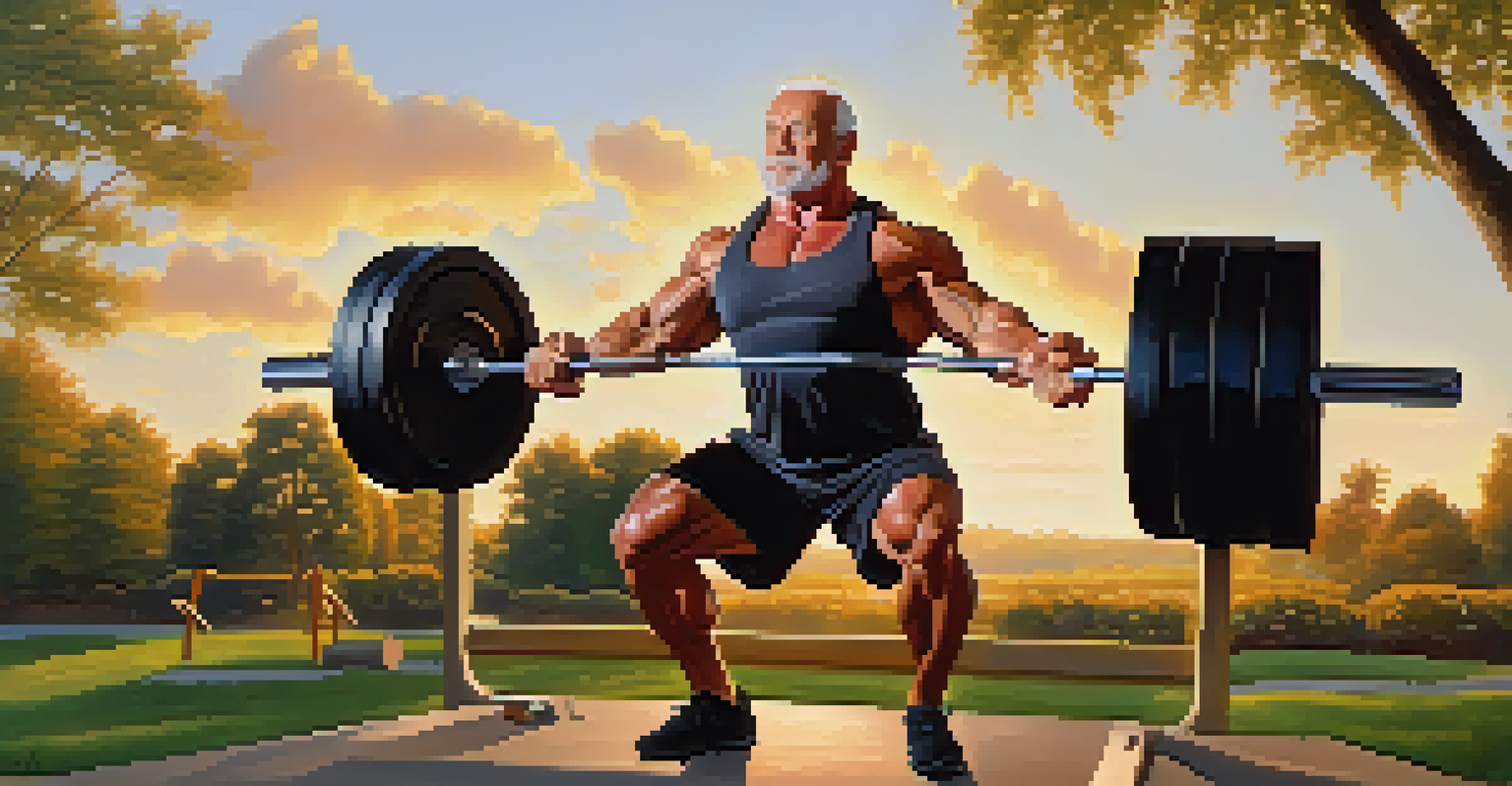Nutrition Strategies for Aging Bodybuilders to Stay Fit

Understanding Nutritional Needs as You Age
As bodybuilders age, their nutritional needs evolve significantly. The body's metabolism tends to slow down, making it crucial to adapt dietary choices accordingly. This shift means that older athletes must pay closer attention to their caloric intake and the quality of the nutrients consumed. A balanced diet rich in whole foods can help maintain muscle mass and overall health.
A healthy outside starts from the inside.
Additionally, older bodybuilders may require more protein to support muscle repair and growth. Research suggests that consuming protein throughout the day, rather than in one large meal, can enhance muscle protein synthesis. This practice helps maintain strength and muscle function, which are vital for performance and injury prevention.
Lastly, hydration becomes even more critical with age. The sensation of thirst often diminishes, leading to potential dehydration. Staying well-hydrated supports muscle function and overall health, making it essential to drink water regularly throughout the day, even if you don't feel thirsty.
The Role of Protein in Aging Bodybuilders' Diets
Protein is often dubbed the building block of muscle, and for aging bodybuilders, it's even more vital. As we age, our bodies become less efficient at utilizing protein, making it necessary to increase intake. Aim for high-quality protein sources such as lean meats, fish, dairy, and plant-based options to ensure you're getting all essential amino acids.

Incorporating protein-rich snacks like Greek yogurt or a protein shake can help meet daily requirements. It’s beneficial to spread protein intake throughout the day, ideally aiming for 20-30 grams per meal. This approach not only supports muscle health but also helps keep you feeling full and satisfied.
Adapting Nutrition for Aging Bodybuilders
As bodybuilders age, it's crucial to adjust dietary choices to meet evolving nutritional needs, focusing on quality nutrients and adequate hydration.
Furthermore, consider adding protein supplements if whole food sources fall short. They can be a convenient way to boost your intake, especially post-workout when your muscles are primed for recovery. However, it’s essential to view supplements as an addition to a well-rounded diet, not a replacement.
Emphasizing Healthy Fats for Optimal Function
Healthy fats play a pivotal role in the diet of aging bodybuilders, supporting hormone production and joint health. Including sources like avocados, nuts, seeds, and olive oil can provide essential fatty acids that promote heart health. These fats are also crucial for absorbing fat-soluble vitamins, which support overall health and wellness.
You are what you eat, so don't be fast, cheap, easy, or fake.
Moreover, omega-3 fatty acids, found in fatty fish such as salmon and mackerel, have anti-inflammatory properties that can aid recovery. This is particularly important for aging athletes, as inflammation can hinder performance and increase recovery time after workouts. Incorporating these healthy fats into meals can help manage inflammation and support joint health.
Don't shy away from including fats in your diet, as they are not the enemy they were once thought to be. Instead of opting for low-fat diets, focus on the type of fats you consume. Moderation is key, and a balanced intake of healthy fats can lead to improved overall fitness and well-being.
Managing Carbohydrates for Energy and Recovery
Carbohydrates often get a bad rap, but they are crucial for fueling workouts, especially for aging bodybuilders. The key is to choose the right types of carbohydrates. Focus on whole grains, fruits, and vegetables that provide not only energy but also vital nutrients and fiber. These foods can help maintain energy levels and support digestive health.
Timing your carbohydrate intake is also essential, particularly around workouts. Consuming carbs before exercising can provide the necessary energy for optimal performance, while post-workout carbs help replenish glycogen stores and aid recovery. Pairing carbohydrates with protein after training can further enhance muscle recovery.
Protein: Key to Muscle Health
Increasing protein intake and spreading it throughout the day is vital for muscle repair and growth in aging athletes.
Moreover, as metabolism slows with age, it may be beneficial to monitor carbohydrate portions. This doesn't mean cutting carbs entirely, but rather being mindful of the quality and quantity consumed. Balancing carbs with proteins and healthy fats can lead to sustained energy levels without excess weight gain.
Micronutrients: The Unsung Heroes of Nutrition
While macronutrients like protein, fats, and carbohydrates often steal the spotlight, micronutrients are equally vital for aging bodybuilders. These vitamins and minerals support numerous bodily functions, including immune health, energy production, and muscle contraction. A diet rich in fruits, vegetables, and whole foods can help ensure you're getting an array of essential micronutrients.
Particular attention should be paid to nutrients like calcium and vitamin D, which are crucial for bone health, especially as we age. Strong bones are essential for maintaining an active lifestyle, reducing the risk of fractures and injuries. Incorporating foods like dairy, leafy greens, and fortified products can help meet these needs.
Don't forget about antioxidants, which play a significant role in reducing oxidative stress and inflammation. Foods rich in antioxidants, such as berries and dark chocolate, can help combat the effects of aging and support overall well-being. A colorful plate is often a good indicator of a nutrient-rich diet.
The Importance of Meal Timing and Frequency
Meal timing and frequency can significantly influence the performance and recovery of aging bodybuilders. Eating smaller, more frequent meals throughout the day can help maintain energy levels and prevent hunger. This approach can also support metabolism and ensure a steady supply of nutrients to the body.
Consider starting your day with a balanced breakfast that includes protein, healthy fats, and complex carbohydrates. This meal sets the tone for your energy levels and can help regulate your appetite throughout the day. Additionally, pre- and post-workout meals are critical for fueling performance and recovery.
Mindful Eating Enhances Nutrition
Fostering a healthy relationship with food through mindful eating can help aging bodybuilders make better nutritional choices and enjoy their meals.
Experimenting with meal timing can help you find what works best for your body. Some may thrive on three larger meals, while others prefer five to six smaller ones. Listen to your body's cues, and adjust your eating habits to optimize your training and recovery.
Staying Mindful: The Psychological Aspect of Nutrition
Nutrition is not only about what you eat but also about how you think about food. As bodybuilders age, it’s essential to foster a healthy relationship with food, focusing on nourishment rather than restriction. Mindful eating encourages individuals to pay attention to hunger cues and make choices that support overall health and fitness.
Practicing mindfulness can help you enjoy your meals and appreciate the flavors and textures of food. This approach can reduce stress around eating and promote healthier choices. Additionally, being mindful can prevent emotional eating, a common challenge for many as they navigate the complexities of aging and fitness.

Consider incorporating practices like meal planning and journaling to stay accountable and intentional about your nutrition. By reflecting on your eating habits and how they affect your body and training, you can make informed decisions that support your fitness goals while enjoying the journey.